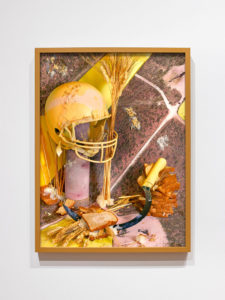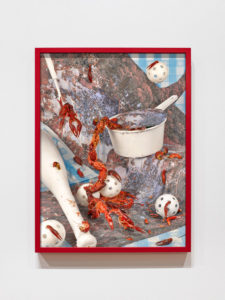Sheida Soleimani
B. 1990, Indianapolis, Indiana. Lives and works in Providence, Rhode Island.
—Isabelle Sakelaris

The daughter of politically engaged Iranian refugees, Sheida Soleimani creates works that address world events, such as the COVID-19 pandemic and violence against women, by examining power structures through a feminist lens. In an interview with the British Journal of Photography, Soleimani remarked, “I consider my work a feminist practice, because it’s associated with the so-called female practices of cutting, making, and even care-taking.”
Whether using found material culled from Google Images or original photographs staged in her studio, Soleimani frequently lets a part stand for a whole. Like an enjambed line in a poem, the fragmented images in Soleimani’s compositions propel the eye across the picture plane and offer multiple avenues for interpretation, inviting the viewer to make connections between the disparate images in her works. This method also encourages the viewer to think critically about what’s being left out and why. In a world with an endless supply of available information, Soleimani’s works empower the viewer to interrogate the media we consume—artistic or otherwise—rather than lending it our implicit trust.


In addition, Soleimani’s use of bright colors and textured backgrounds draw the viewer into the conversation and ask us to spend time there. By suggesting rather than spelling out the violence she so often takes up, Soleimani maintains the privacy and agency of her subjects instead of probing into their pain. The care she takes with respect to her figures, coupled with the visually enticing form of her works, makes for a compelling environment for inquiry into the complicated issues she depicts.
Soleimani graduated from the Cranbrook Academy of Art’s MFA program in 2015. In 2020, she held solo exhibitions at Denny Dimin Gallery in New York and Harlan Levey Projects in Brussels; she is also represented by Edel Assanti in London. In 2021, she will have solo shows at Providence College in Rhode Island and the Castello San Basilio in Basilicata, Italy.
